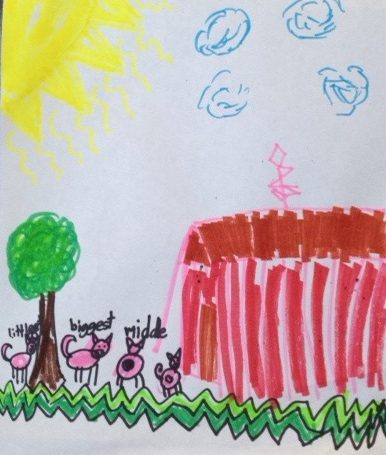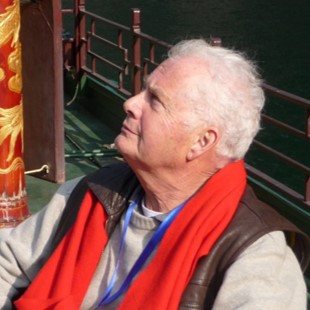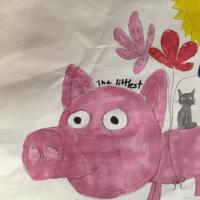I’ve received quite a few requests from readers about my story “Littlest’s Adventure – Yet Another Bedtime Story (Part One).” They (and their kids) wanted to know what would happen to The Littlest, the youngest of the four piglets and the only girl.
So here is Part Two. Since Maya, my illustrator, has been so busy with gymnastics, tennis, her pokemon collection, and her many other interests, she hasn’t had much time to illustrate for the book. But she’s promised that she’ll do several more drawings in the next two or three weeks. Let’s see.
The pig family, Pig Papa, Pig Mama, and their four piglets, live a happy life on a farm at a bend of a river. One day, the Littlest, the youngest of the piglets and the only girl, realizes that they’re going to be sent to a slaughterhouse. Despite her family’s objection, she plans her escape. Will she succeed? Will her family be on her side eventually? Here is a story of defying odds and overcoming obstacles, of love for freedom, and of what it means to be a family.
Littlest’s Adventure – Yet Another Bedtime Story (Part 2)
Littlest stood still, alone and lonely. But she’d made up her mind. No matter what, she would get out of here and never return. No, she didn’t have to accept her fate. There was no such a thing called fate. She was her own boss and she would prove that.
That night, while her parents and brothers were sleeping soundly in the shed, Littlest began to cut the chain link with her teeth. She chose the back of the pen, so the farmer’s wife wouldn’t see. Every bite hurt her teeth and the loose wires slashed her skin. But the fence was well built and the iron wires were sturdier than she had thought. Even though she tried her hardest, the hole she made was no bigger than a cantaloupe by the time the sun rose.
When Pig Papa, Pig Mama, and their four sons got up, Littlest was still working on the fence. Seeing her daughter’s bloody face, Pig Mama cried and was about to dress her wounds with the herb medicine she had made.
But Pig Papa stopped her. “This is a lesson she has to learn,” Pig Papa said. “Now she knows she must listen to us.”
“I won’t stop. I’ll continue tonight,” said Littlest defiantly despite her pain and exhaustion.
When the farmer’s wife came to feed the pigs in the morning she discovered the hole. She thought it was done by a raccoon. “Stupid pigs,” she said angrily, without looking at the pigs. “They didn’t even make a noise when they saw a raccoon.” She called her husband and he blocked the hole with a thick wooden board.
It took Littlest three days to recover. The fourth night, as soon as her parents and brothers fell asleep, Littlest started to dig underneath the fence. It was cold and windy. Since it hadn’t rained for days, the soil was hard. Soon, Littlest’s nails were broken. But she didn’t stop. She dug, dug, and dug, dreaming of the days when she could roam in the forest or on the grassland, when she could pick wild flowers and drink from a waterfall.
By daybreak, she had made a hole as big as a basketball. But it still wasn’t big enough for her. After all, she was a pig, not a rabbit. When her parents and brothers got up she was so tired that she fainted. Pig Mama and her brothers carried her to the shed.
Pig Papa, though worrying about his daughter, refused to help. “Being stubborn and ambitious doesn’t help, does it?” he said, more to himself than to anyone else.
He once had dreamed of being free too, and had even contemplated to escape when he wasn’t much older than Littlest. But he never carried out his plan. He was afraid of failure, of being laughed at by his parents and siblings, and of being caught by the farmer and his wife. Now, at his age, he felt he had seen the world. Though he might appear to be optimistic in his wife’s and children’s eyes, he was really a pessimist.
“We’re all in the gutter,” he said to himself, quoting Oscar Wilde, as a fallen leaf hit his face. But since he didn’t like to be sad, he immediately cheered himself up by reciting a Chinese saying, “Those who’re satisfied are the happiest.” Maybe there was indeed a heaven or afterlife, where he and his family could live happily forever, he further comforted himself.
Though Littlest had covered the hole with straws, grass and leaves, the farmer’s wife still saw the hole when she came to feed the pigs. “These stupid pigs,” she said with contempt. “I bet they can still snore inside a wolf’s stomach.” She called her husband and he filled the hole with a big rock.
This time, it took Littlest five days to recover—she had a fever and diarrhea. She had been small to begin with and now she was even smaller, barely half of the size of Little First. With her skinny body and glistening eyes, she looked more like a starving wild beast than a farm animal.
Suspecting that the pigs wanted to escape, the farmer—much smarter than his wife—began to check on the pen every morning and evening. He noticed how bony Littlest was and began to feed her separately, often with sweet corns and the mix of wheat and barley. Sometimes he even put vitamins and minerals into the food to make sure Littlest was healthy.
His effort soon paid off. Littlest, though still the smallest among the piglets, gained fifteen pounds in a week. It brought smiles to the farmer’s face. More meat meant more money. Even a fool knew that.
With the slaughter day approaching, Littlest grew more and more silent and withdrawn. She rarely joined her family in the mud war, which her siblings loved. She didn’t laugh at jokes, she stayed away from games. Her siblings by now had learned to ignore her. She was a joy killer, a mood destroyer, that was what she was. What did she want anyway? She got extra attention from the farmer, she got better food, she got more love from their mother, who often gave Littlest extra hugs at bedtime. Wasn’t that enough?
Behind her back, they called her a “hypocrite.” Wasn’t she? Look how vigorously she ate now! Not long ago, she had pretended that she didn’t care about food.
If Littlest’s brothers envied her for the special treatment she was getting, her parents were now relieved, assured that their daughter had given up her crazy escape plan. She was eating a lot—proof in itself. As for her silence and aloofness, they weren’t concerned. On the contrary, they saw that as something good—obviously, their daughter needed time to reflect on her naivety and stupidity after her two miserable failures.
…….
(To be continued. Do you think Littlest has given up? Or is she going to try something new? The next installment will be posted in a week.)







